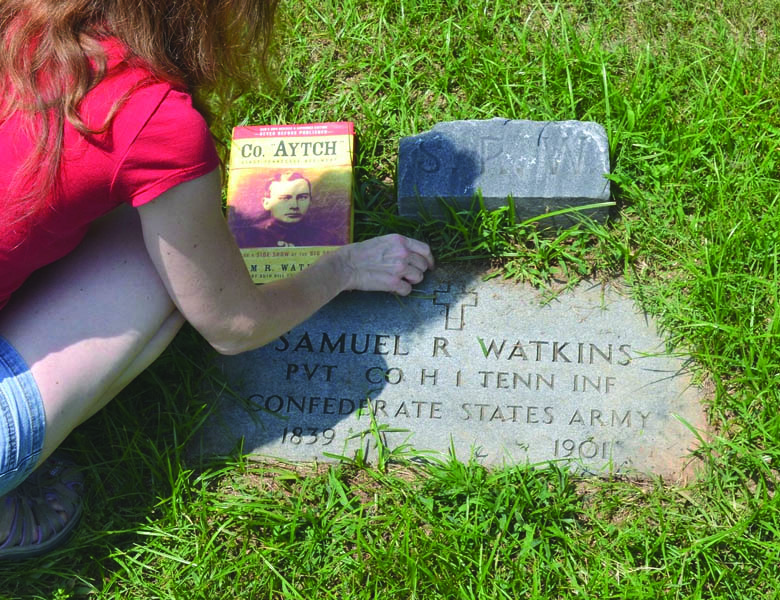Sam Watkins’ memoirs tell the real story of the Civil War

Sam Watkins’ grave at Zion Cemetery in Maury County.
If you want to know what it was really like to have been in the Civil War, try reading the memoirs of a famous Confederate private.
His name was Sam Watkins, and he was a soldier in the First Tennessee Infantry, Company H.
A Maury County native, Watkins fought at Shiloh, Murfreesboro, Chattanooga, Chickamauga, Kennesaw Mountain, Franklin and Nashville.
Of the 1,200 men who originally enlisted in the First Tennessee Infantry (Confederate Army), Watkins was one of only 65 who remained in the spring of 1865.
After the war, Watkins married, had children and made his living as a storekeeper and farmer. About twenty years after the war, he wrote his recollections as a soldier. They were originally published as a series of articles in the Columbia Herald and later reprinted as a book called Company Aytch: Or a Sideshow of the Big Show.
At a time when many Civil War accounts were descriptions of troop movements and casualty counts, Watkins account was startling to readers for its honesty. Company Aytch contains horrifying descriptions of battles and amusing anecdotes about day-to-day life as a soldier. For instance:
Watkins frequently did guard duty in the middle of the night, sometimes when the U.S. Army was camped out just across a road or river. During those nights, it was not unusual for guards on opposing armies to become friends. “We got very friendly during the night, and made a raid upon a citizen’s pantry, where we captured a bucket of honey, a pitcher of sweet milk, and three or four biscuits,” he wrote.
At other times, guards tried to kill each other. In July 1864 Watkins killed a federal scout outside Atlanta in the middle of the night. “I saw, or I thought I saw, the dim outlines of a Yankee soldier, lying on the ground not more than ten steps from where I stood,” he wrote. “I raised my gun, placed it to my shoulder, took deliberate aim, and fired, and ‘waugh-weouw,’ the most unearthly scream I had ever heard greeted my ears.” Two days later, Watkins found that the dead Yankee had been stripped of his clothes and possessions and that his body had become swollen and blackened from exposure to the heat. “He scared me worse when dead than when living.”
Soldiers were often required to witness executions, ostensibly as a way of maintaining discipline. One time Watkins witnessed the execution of two U.S. Army spies, one of which he believed to be 14 years old. “The youngest one began to beg and cry and plead most piteously. It was horrid. The older one kicked him, and told him to stand up and show the Rebels how a Union man could die for his country.” Another time, a snowball fight was interrupted by an execution. “He [the condemned] had no sooner been taken up and carried off to be buried, than the soldiers were throwing snowballs as hard as ever, as if nothing had happened.”
Like many other low-ranking enlisted men, Watkins complained about how well officers were treated. “The private’s pay was eleven dollars per month, if he got it; the General’s pay was three hundred dollars per month, and he always got his . . . A General could resign. That was honorable. A private could not resign, nor choose his branch of service, and if he deserted, it was death.”
Watkins had strong opinions about the generals for whom he fought. He did not care for Braxton Bragg, commander of the army of Tennessee during the battles of Stones River and Chickamauga. “None of General Bragg’s soldiers ever loved him,” Watkins wrote. “He was looked upon as a merciless tyrant.” However, Watkins thought the world of Bragg’s successor Joseph Johnston. “His lines of battle were invulnerable. The larger his command, the easier he could handle it. When his army moved, it was the picture of battle, everything in its place, as laid down by scientific military rules.”
Watkins descriptions of individual battles are incomparable. Here is an excerpt from his account of the Battle of Kennesaw Mountain: “A solid line of blazing fire right from the muzzles of the Yankee guns being poured right into our very faces, singeing our hair and clothes, the hot blood of our dead and wounded spurting on us, the blinding smoke and stifling atmosphere filling our eyes and mouths, and the awful concussion causing the blood to gush out of our noses and ears, and above all, the roar of battle, make it a perfect pandemonium. . . The ground was piled up with one solid mass of dead and wounded Yankees.”
After the Battle of Missionary Ridge, Watkins and his fellow soldiers had to leave behind a wounded comrade. Shot through the head, with “his blood and brains smearing his face and clothes,” there was no hope of Tom Webb surviving. “The Yankees were then advancing and firing upon us. What could we do? We could not carry him any further, and we could not bury him, for he was still alive. To leave him where he was we thought best . . .
“We kissed him goodbye and left him to the tender mercies of the advancing foe, in whose hands he would be in a few moments.”

